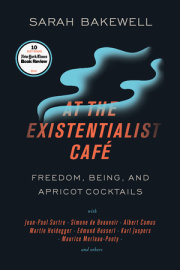"We're in the middle of a boom in serious popularizing books that try to bring us closer to the classics by anchoring them in the lives of their creators, books like Stephen Greenblatt's Will In The World, which explores how young Shakespeare made himself into Will Shakespeare, and Sarah Bakewell's At The Existentialist Cafe, which grounds the work of Sartre, Camus, de Beauvoir and others in their gaudy personal experience." —NPR’S FRESH AIR
“The apricot cocktails in her subtitle and her sometimes breezy tone— ‘I like to imagine them in a big, busy café of the mind, probably a Parisian one’— seem to promise an undemanding, gossipy romp. Instead, [Bakewell] judges and explains the ways in which each writer responded to the moral and political crises of the 1930s and after, and her book asks demanding questions about the ways in which people think about themselves and their relations with others. She shapes her answers in the form of biographical narratives, because her central theme is that the large impersonal ideas pursued by much modern philosophy are less profound and illuminating than the varied and conflicting truths found in stories of individual lives. Those stories, in this book, include impressively lucid descriptions of what these thinkers thought and what they said in their writings and café arguments.” --The New York Times Book Review
“At the Existentialist Café is a bracingly fresh look at once-antiquated ideas and the milieu in which they flourished. Ms. Bakewell’s approach is enticing and unusual: She is not an omniscient author acting as critic, biographer or tour guide. This book is full of winning small details. Some may find the description of Camus as ‘a simple, cheerful soul,’ as surprising as Sartre’s apparently charming Donald Duck imitation… ‘When reading Sartre on freedom, Beauvoir on the subtle mechanisms of oppression, Kierkegaard on anxiety, Camus on rebellion, Heidegger on technology or Merleau-Ponty on cognitive science,’ Ms. Bakewell writes, ‘one sometimes feels one is reading the latest news.’” —Janet Maslin, The New York Times
“Ms. Bakewell’s jaunty, colloquial style very successfully brought the ideas of Michel de Montaigne to a wide and general audience in her best-selling How to Live. The existentialists and their subtle differences from the phenomenologists in the context of World War II and its aftermath are a much greater challenge, which she meets with equal elan." —The Wall Street Journal
“This lively history of the existentialist movement makes a strong, if sometimes disorienting, case for the inextricability of philosophy and biography, embedding dense concepts—such as ‘being,’ ‘nothingness,’ and ‘bad faith’—in the colorful lives and milieus of those who debated them. Though the book is in many ways a group study, dotted with cameo appearances by Albert Camus, Simone de Beauvoir, Maurice Merleau-Ponty, and others, it focusses on Heidegger and Sartre. Heidegger appears as oracular, hermetic, and Nazi-tainted; Sartre as intellectually promiscuous and Soviet-sympathizing. Their divergent characters and checkered reputations lend credence to Bakewell’s view that ‘ideas are interesting, but people are vastly more so.’” —The New Yorker
“Brisk and perceptive…A fresh, invigorating look into complex minds and a unique time and place.” —Kirkus Reviews (starred review)
"Bakewell brilliantly explains 20th-century existentialism through the extraordinary careers of the philosophers who devoted their lives and work to 'the task of responsible alertness' and 'questions of human identity, purpose, and freedom.' Through vivid characterizations and a clear distillation of dense philosophical concepts, Bakewell embeds the story of existentialism in the 'story of a whole European century,' dramatizing its central debates of authenticity, rebellion, freedom, and responsibility." —Publishers Weekly (starred review)
“Bakewell follows her celebrated study of Montaigne…with a lively appraisal of existentialism and its leading thinkers…With coverage of friendship, travel, argument, tragedy, drugs, Paris, and, of course, lots of sex, Bakewell’s biographical approach pays off… The result is an engaging story about a group of passionate thinkers, and a reminder of their continued relevance.” —Booklist (starred review)
“Sweeping and dazzlingly rich...This wonderfully readable account of one of the 20th century’s major intellectual movements offers a cornucopia of biographical detail and insights that show its relevance for our own time.” —BookPage
"Tremendous...rigorous and clarifying...Highly recommended for anyone who thinks." —Library Journal (starred review)
“In her instructive and entertaining study of these thinkers and their hangers-on, Sarah Bakewell… credits the existentialist movement, broadly defined, with providing inspiration to feminism, gay rights, anti-racism, anti-colonialism and other radical causes. A few cocktails can, it seems, lead to unexpected things.” —The Economist
“These days, the word 'existentialism' brings to mind black turtlenecks, French cigarettes, and a distinctly European sense of despair. But as Sarah Bakewell describes them in this vivid, vital group biography, existentialists like Jean Paul Sartre, Simone de Beauvior, and Albert Camus were courageous free thinkers in an age of fascism, totalitarianism, and conformity.”—The Boston Globe
“A vivid and warmly engaging intellectual history.” —The Los Angeles Times
“Bakewell has made weighty, complex philosophical ideas feel exhilarating — for that she should be praised, and read.” —The San Francisco Chronicle
“Although biography provides the narrative momentum of At the Existentialist Café, much of the meat comes from the philosophy…Bakewell has a knack for crystallising key ideas by identifying choice original quotations and combining them with her own words…Perhaps the aphorism that best captures the book is one of Bakewell’s own: 'Thinking should be generous and have a good appetite.' Her hunger is infectious.” —Financial Times
“[At the Existentialist Café] offers fascinating insights into the cultural impact of existentialism on the English-speaking world…Existentialism, in all its incarnations, is really about making choices. How to live? How to be free? How to be an 'authentic' human being? In her summing-up, Bakewell makes the case that these questions remain as important today as they ever were.” —The Guardian (US)
“Bakewell writes with a sunny disposition and light touch…She combines confident handling of difficult philosophical concepts with a highly enjoyable writing style. I can’t think of a better introduction to modern intellectual history.” —Newsday
“Bakewell’s How to Live [was] a remarkably erudite and accessible study of the life of Montaigne…At first skeptical, I was soon warmed over by the author’s preternaturally smooth style. At the Existentialist Café does precisely the same for Jean-Paul Sartre, Simone de Beauvoir, Albert Camus, and Martin Heidegger.” —Flavorwire
“This tender, incisive and fair account of the existentialists ends with their successive deaths, leaving me with the same sense of nostalgia and loss as one feels after reading a great epic novel.” —The Telegraph
“[At] the Existentialist Café is packed with out-of-the-way knowledge and has a cast of weird characters such as only a gathering of philosophers could supply. It is written with affection. Even the horrible Heidegger is seen as human in his absurdity.” —The Sunday Times
“[E]ngaging and wide-ranging.” —Prospect Magazine
“[At the Existentialist Café is] a wonderfully readable combination of biography, philosophy, history, cultural analysis and personal reflection.” —The Independent
“At the Existentialist Cafe will prove to be one of the best books on philosophy you will read this year.” —The Wichita Eagle
“[An] invigorating book.” —Tablet
"Irresistible." —Buffalo News
"Don’t let the breezy title put you off. At the Existentialist Café, Sarah Bakewell’s group portrait of Husserl, Heidegger, Sartre, Beauvoir, and the other 'Continental' philosophers who flourished before and after World War II, is a work of deep intelligence and sympathy, reminding us how exciting those thinkers can be. And it’s a page-turner. I was so sorry to finish the last chapter that I almost—almost—ran over to the Strand to see what they had by Merleau-Ponty." —Paris Review Daily
“At the Existentialist Café: Freedom, Being, and Apricot Cocktails combines the exhilaration of initial discovery with the more considered evaluations of a mature thinker. The result is a warm and challenging work of intellectual history that retains something of existentialism’s glamor without ever sacrificing its vigorous interrogation. It also re-centers existentialism as a viable method of philosophically engaging with contemporaneity. Even if the context has shifted slightly, the question it asks remains just as relevant now as in the post-war years: what shall we make of a shattered world?” —The Brooklyn Rail
"It's not often that you miss your bus stop because you're so engrossed in reading a book about existentialism, but I did exactly that while immersed in Sarah Bakewell's At the Existentialist Café. The story of Sartre, Beauvoir, Camus, Heidegger et al is strange, fun and compelling reading. If it doesn't win awards, I will eat my proof copy." —Katy Guest, The Independent on Sunday





